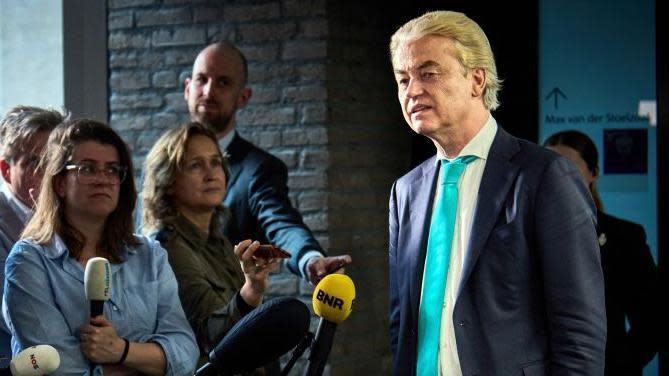After six months, Dutch parties reach government deal

- Oops!Something went wrong.Please try again later.
Almost six months after Dutch anti-Islam populist leader Geert Wilders won the Dutch election, he and three other party leaders have agreed a provisional agreement to form a right-wing government.
A final decision has not been made on the next Dutch prime minister, but it will not be Mr Wilders, who gave up the chance in a bid to secure a deal.
"We have a negotiators' agreement and we will now put it to our [parliamentary] factions," the Freedom Party leader told journalists.
If they agree, his party will go into government with the conservative-liberal VVD, the centrist New Social Contract and the Farmer Citizens Movement (BBB).
Mr Wilders' far-right PVV attracted a quarter of the national vote in last November's election, after agreeing to put on hold some of his more extreme policies, such as banning the Quran, Islamic schools and mosques.
His victory stunned European politics, following 14 years of broad-based coalitions led by VVD Prime Minister Mark Rutte, who has continued as caretaker prime minister since the election.
But the four-party talks on forming a right-wing coalition collapsed in February, and by March Mr Wilders had abandoned his bid to become prime minister.
The man who brokered that first round of talks, Ronald Plasterk, is now favourite to be offered the job of prime minister. A 67-year-old former Labour party minister, he gave up a flourishing academic career as a molecular biologist to go into politics.
Mr Wilders, 60, said no decision had yet been made on who would lead the government, although it had been discussed in the negotiations.
The deal came hours before the latest deadline imposed by the current coalition negotiators and Mr Wilders warned that adjustments could still be made to the deal. Parliament will then debate the terms next week.
When asked what had taken them so long, the leader of the conservative-liberal VVD, Dilan Yesilgöz, pointed out that they were after all "setting the framework for the next government".
Her VVD came a poor third in the election and lost 10 seats in parliament.
Few details have emerged of the four parties' plans for government, although they are expected to adopt hardline policies on asylum and immigration. According to political correspondents, there are particularly strong measures on migrant workers, although the government would continue to respect international agreements.
Significant investment is also expected in social security and housing as well as defence and agriculture.
The four party leaders are not expected to be part of the new cabinet but will remain in parliament.
Unusually, the so-called extra-parliamentary cabinet is likely to be made up of ministers who are not in the parliament either, but will have to follow the main terms of the agreement.
The head of the Farmer Citizen Movement, Caroline van der Plas, said it was "very nice for the Netherlands" that they had reached a deal.

